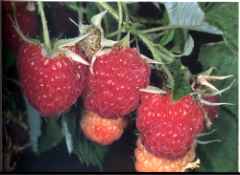 Blackberries...Raspberries,
Berry Good!
Blackberries...Raspberries,
Berry Good!
 Blackberries...Raspberries,
Berry Good!
Blackberries...Raspberries,
Berry Good!
Small fruits are very popular with gardeners, especially those lacking in acreage needed for apples, peaches, pears, etc. Two delectable small fruits are blackberries and raspberries. Today I will describe the difference between these plants by explaining some cultural practices which apply to each of these plants.
Both plants prefer a fertile garden soil which has good drainage. A pH of 6 to 7 is suitable. Full sun is desired although raspberries will tolerate a good deal of shade. Fertilization needs are fairly light, with a feeding in mid March of 10-10-10. Fertilization later in the season can cause the plants to focus their energy on foliage production rather than fruit production. Like many other plants, stimulation of late season growth through pruning or fertilization could cause winter damage because the new growth may not have time to "harden" off. The plants are generally hardy up to Zone 5. Blackberries and raspberries are self-pollinating meaning that they don't need another plant to be fruitful.
Blackberries come in upright, erect forms and trailing forming, depending on the variety. The "trailers" will probably need some staking to keep them off of the ground. Blackberries have canes which multiply rapidly and, left unchecked, can take over the world. In early March prune the lateral growing branches to 8 inches, and remove most of the center branches. You should also remove any older non-productive canes. A typical pruning should leave you with about half the number of canes as you had prior to pruning. By the end of June, you may want to pruning the tips of the canes to promote more lateral branching for increased fruit production.
Raspberries come in "standard" and "everbearing" forms. They are both biennials, meaning that the canes will only live 2 years. The "standard" plant will bear fruit in its second and final year. The "everbearing" plant will bear fruit late in the first year (fall) and more heavily in the second year (summer). The "standard" will usually produce more fruit in the long run. On an "everbearing" plant, remove the canes after they have produced in the summer. For "standard" plants, remove any cane that is finished bearing. These removals should be done in March. To quote Tony Orlando & Dawn, "Tie a yellow ribbon 'round the raspberry cane." I think the year was 1972.
Diseases can exist in your plants, so good sanitation is important. Discard all old or diseased canes. Another challenge is competing with the birds for the fruit. Birds know the berry is ripe 10 minutes before you know. Some lightweight plastic netting should help preserve some of the crop for you. The berries will be ripe when the color is good, the fruit's a little soft, and the berry easily comes off of the vine. Until next week.
Andy Lynn